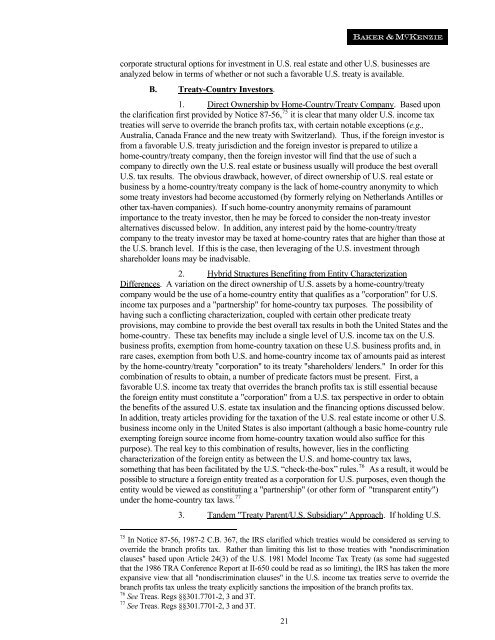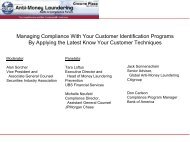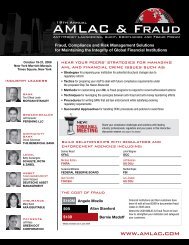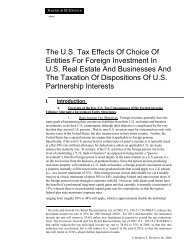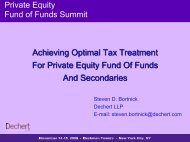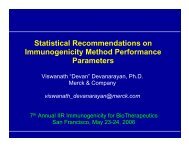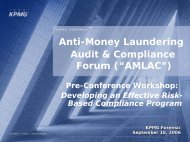The US Tax Effects Of Choice Of Entities For Foreign Investment - IIR
The US Tax Effects Of Choice Of Entities For Foreign Investment - IIR
The US Tax Effects Of Choice Of Entities For Foreign Investment - IIR
You also want an ePaper? Increase the reach of your titles
YUMPU automatically turns print PDFs into web optimized ePapers that Google loves.
corporate structural options for investment in U.S. real estate and other U.S. businesses are<br />
analyzed below in terms of whether or not such a favorable U.S. treaty is available.<br />
B. Treaty-Country Investors.<br />
1. Direct Ownership by Home-Country/Treaty Company. Based upon<br />
the clarification first provided by Notice 87-56, 75 it is clear that many older U.S. income tax<br />
treaties will serve to override the branch profits tax, with certain notable exceptions (e.g.,<br />
Australia, Canada France and the new treaty with Switzerland). Thus, if the foreign investor is<br />
from a favorable U.S. treaty jurisdiction and the foreign investor is prepared to utilize a<br />
home-country/treaty company, then the foreign investor will find that the use of such a<br />
company to directly own the U.S. real estate or business usually will produce the best overall<br />
U.S. tax results. <strong>The</strong> obvious drawback, however, of direct ownership of U.S. real estate or<br />
business by a home-country/treaty company is the lack of home-country anonymity to which<br />
some treaty investors had become accustomed (by formerly relying on Netherlands Antilles or<br />
other tax-haven companies). If such home-country anonymity remains of paramount<br />
importance to the treaty investor, then he may be forced to consider the non-treaty investor<br />
alternatives discussed below. In addition, any interest paid by the home-country/treaty<br />
company to the treaty investor may be taxed at home-country rates that are higher than those at<br />
the U.S. branch level. If this is the case, then leveraging of the U.S. investment through<br />
shareholder loans may be inadvisable.<br />
2. Hybrid Structures Benefiting from Entity Characterization<br />
Differences. A variation on the direct ownership of U.S. assets by a home-country/treaty<br />
company would be the use of a home-country entity that qualifies as a "corporation" for U.S.<br />
income tax purposes and a "partnership" for home-country tax purposes. <strong>The</strong> possibility of<br />
having such a conflicting characterization, coupled with certain other predicate treaty<br />
provisions, may combine to provide the best overall tax results in both the United States and the<br />
home-country. <strong>The</strong>se tax benefits may include a single level of U.S. income tax on the U.S.<br />
business profits, exemption from home-country taxation on these U.S. business profits and, in<br />
rare cases, exemption from both U.S. and home-country income tax of amounts paid as interest<br />
by the home-country/treaty "corporation" to its treaty "shareholders/ lenders." In order for this<br />
combination of results to obtain, a number of predicate factors must be present. First, a<br />
favorable U.S. income tax treaty that overrides the branch profits tax is still essential because<br />
the foreign entity must constitute a "corporation" from a U.S. tax perspective in order to obtain<br />
the benefits of the assured U.S. estate tax insulation and the financing options discussed below.<br />
In addition, treaty articles providing for the taxation of the U.S. real estate income or other U.S.<br />
business income only in the United States is also important (although a basic home-country rule<br />
exempting foreign source income from home-country taxation would also suffice for this<br />
purpose). <strong>The</strong> real key to this combination of results, however, lies in the conflicting<br />
characterization of the foreign entity as between the U.S. and home-country tax laws,<br />
something that has been facilitated by the U.S. “check-the-box” rules. 76 As a result, it would be<br />
possible to structure a foreign entity treated as a corporation for U.S. purposes, even though the<br />
entity would be viewed as constituting a "partnership" (or other form of "transparent entity")<br />
under the home-country tax laws. 77<br />
3. Tandem "Treaty Parent/U.S. Subsidiary" Approach. If holding U.S.<br />
75 In Notice 87-56, 1987-2 C.B. 367, the IRS clarified which treaties would be considered as serving to<br />
override the branch profits tax. Rather than limiting this list to those treaties with "nondiscrimination<br />
clauses" based upon Article 24(3) of the U.S. 1981 Model Income <strong>Tax</strong> Treaty (as some had suggested<br />
that the 1986 TRA Conference Report at II-650 could be read as so limiting), the IRS has taken the more<br />
expansive view that all "nondiscrimination clauses" in the U.S. income tax treaties serve to override the<br />
branch profits tax unless the treaty explicitly sanctions the imposition of the branch profits tax.<br />
76 See Treas. Regs §§301.7701-2, 3 and 3T.<br />
77 See Treas. Regs §§301.7701-2, 3 and 3T.<br />
21


